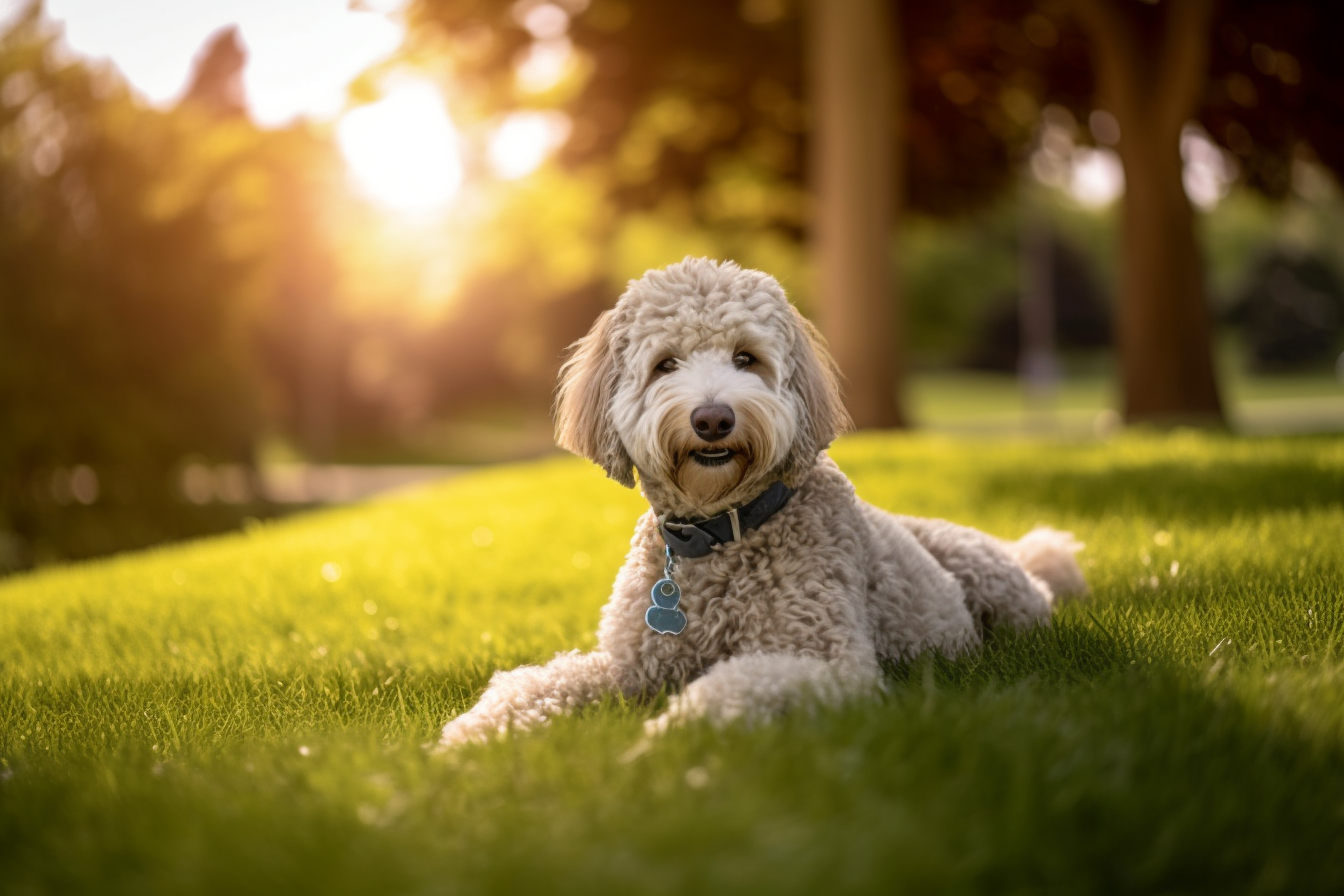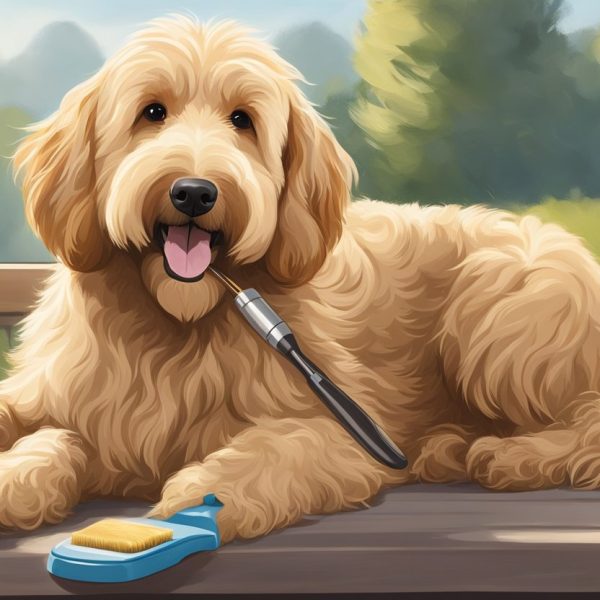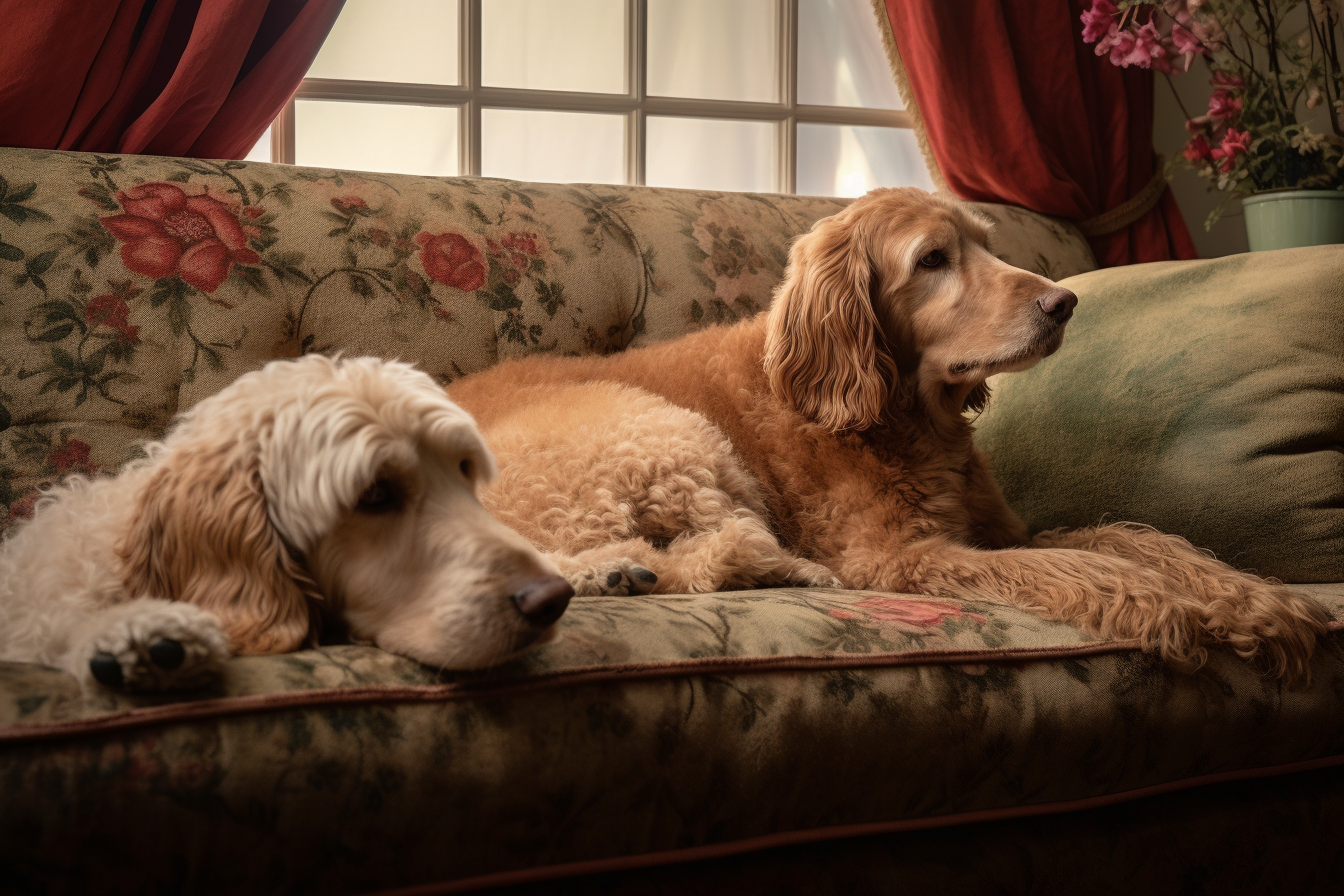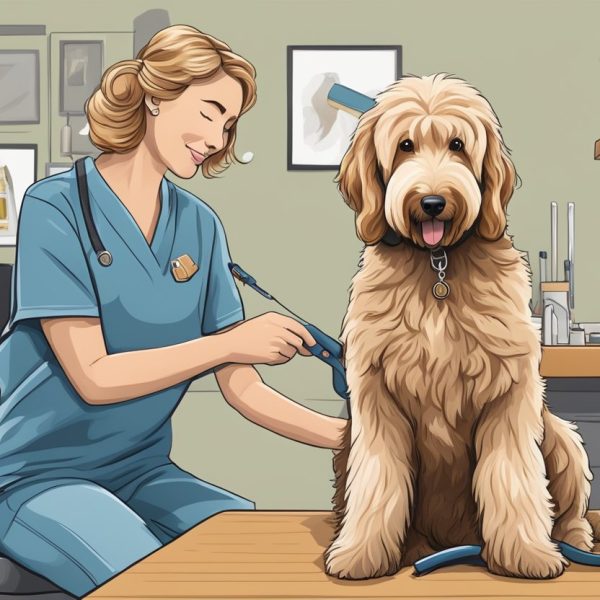When considering adding a furry member to your family, the poodle often stands out as the epitome of canine elegance. However, while their stylish cuts and regal posture might give off a serious vibe, these dogs are quite the opposite. Playful poodles harness an energetic and joyful spirit that can liven up any home. Your source for Minnesota’s most playful, intelligent poodle puppies can offer insights into the delightful nature of these curly-coated companions.

Affectionately known as great partners for lively play sessions, poodles possess an energy level that ranges from moderate to high. They need regular exercise like brisk walks, jogging, or swimming to keep fit and satisfied. These bouts of physical activity also play a key role in fostering a calm indoor demeanor, allowing both you and your poodle to enjoy relaxed time together after a playful day.
With their keen intelligence, they require both physical and mental stimulation to stay sharp. Don’t be fooled by their sophisticated appearance—standard Poodles may be easy to train and fun to play with, but they are also interactive pets that thrive on companionship. They don’t just excel in agility and obedience training; they are also part of the family, forming strong bonds and often being exceptionally good with children and other pets.
Playful Poodles Overview


When you think of Poodles, you’re likely envisioning a breed that is as lively as it is intelligent. These dogs are not just about posh looks; they’re spirited companions that bring joy to families and individuals alike.
Origin of Poodles
Derived from the German word “pudel,” meaning to splash in water, Poodles were originally bred as water retrievers. Their history traces back to Germany, but the breed was standardized in France, which is why they’re often associated with French culture.
Characteristics of Poodles
Poodles come in three sizes: Standard, Miniature, and Toy. Regardless of size, they’re known for their curly coats and exceptional intelligence. They’re often described as playful and energetic, which makes them excellent companions. In addition to their playfulness, they are also:
- Highly trainable: Poodles are eager to please and quick to learn.
- Great with families: Their friendly behavior makes them good with children and other pets.
- Active: They require regular exercise to keep their spirited nature in balance.
Poodles’ adaptability and joyful disposition make them a beloved breed worldwide.
Understanding Poodle Playfulness


Poodle playfulness is a delightful and intrinsic trait of these intelligent and social dogs. By recognizing what ignites their playful spirit and fostering an environment conducive to play, you nurture their mental and physical well-being.
Psychology Behind Play
Why do Poodles play? Just as with humans, play is a crucial aspect of your Poodle’s mental and emotional health. This behavior is rooted in their instinctual heritage, where play served as a practice for survival skills. Now, it’s more about companionship, learning, and enjoyment. When you see your Poodle bounding about, what you’re witnessing is the expression of their intelligence and social nature. Moreover, play activities can signify trust and affection when directed toward you or other family pets.
Encouraging Play in Poodles
Encouraging your Poodle to play is beneficial for their overall happiness. Here’s a quick guide on how to do just that:
- Provide a variety of toys: Poodles are smart and can get bored easily, so keep a mix of puzzles, chew toys, and fetch toys to stimulate different senses and types of engagement.
- Engage in regular play sessions: Due to their social nature, Poodles often enjoy playtime more when you’re involved. Regular interactive sessions strengthen your bond and keep your Poodle’s playful spirit alive.
- Understand their body language: A wagging tail and playful bow are clear indicators your Poodle is ready for fun. Respond to these signals with enthusiasm to reinforce their behavior.
Using these strategies will help maintain your Poodle’s vivaciousness and contribute to a joyful, fulfilling relationship between you and your furry friend.
Training Playful Poodles
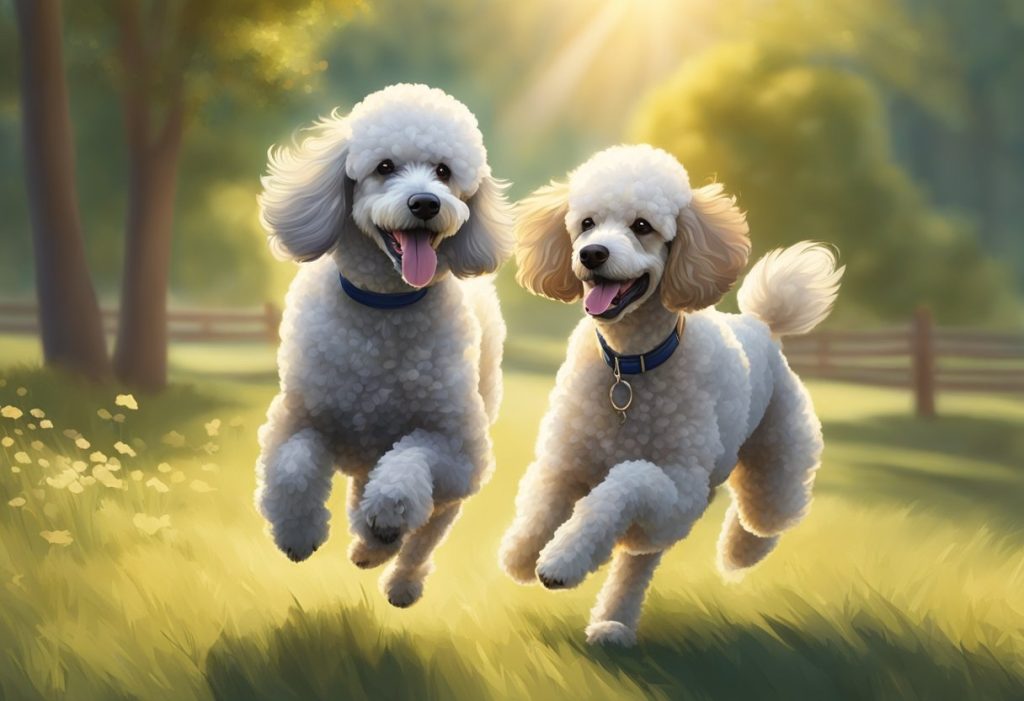

Training your poodle can be a joyful journey given their playful nature and intelligence. They respond well to positive reinforcement and creative training techniques.
Basic Training Principles
When starting out, establishing a routine is key. Your poodle will thrive on consistency and clear communication. Always use positive reinforcement, such as offering praise and treats when your poodle performs a command correctly. It’s important to start with basic commands like sit, stay, and come, which provide a foundation for more advanced training later on.
- Begin with short training sessions (5-10 minutes).
- Gradually increase difficulty and duration.
- Maintain consistency in commands and expectations.
Training Through Play
Turning training into a game can enhance your poodle’s natural curiosity and willingness to learn. For example, when teaching fetch, incorporate the command “come” so that returning the ball becomes part of the game. Use toys and activities they naturally enjoy to reinforce new skills and behaviors.
- Fetch: Reinforces ‘come’ and ‘drop it’.
- Hide and Seek: Encourages ‘stay’ and ‘come’.
- Agility Training: Builds on commands and improves fitness.
Remember, stay patient, and keep it fun!
Exercise Needs for Poodles
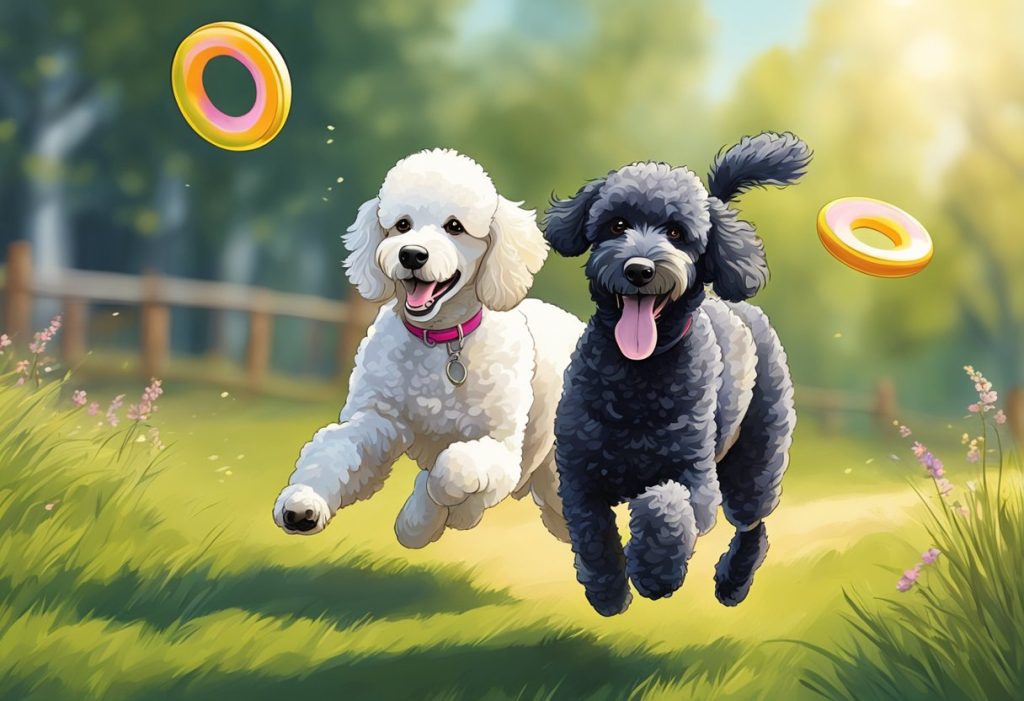

Caring for Poodles means ensuring they get enough exercise to stay healthy and happy. This energetic breed requires both physical and mental activities to satisfy their high intelligence and agility.
Physical Exercise Requirements
Your Poodle’s need for physical exercise varies with size.
- Toy Poodles: They thrive on 30-45 minutes of daily exercise such as walks or playtime.
- Miniature and Standard Poodles: Require more vigorous exercise. Aim for walking, jogging, or yard play for at least an hour every day.
- Activities: Poodles often enjoy water-based activities, so swimming can be a fantastic way for them to exercise.
Mental Stimulation Activities
Considering their intelligence, Poodles also need mental exercises to stay sharp.
- Puzzle Toys: Engage their brain with puzzle games designed for dogs.
- Training: Regular sessions of learning commands and tricks not only teach them good behavior but also keep their minds active.
Remember, your Poodle’s exercise routine can be fun for both of you. It’s an opportunity to strengthen your bond and keep your furry friend in top shape, both physically and mentally.
Playful Poodles and Socialization
Poodles thrive on interaction and require ample socialization to develop a well-rounded personality. Your Playful Poodle will be at their happiest and healthiest when properly socialized from a young age with both other dogs and people.
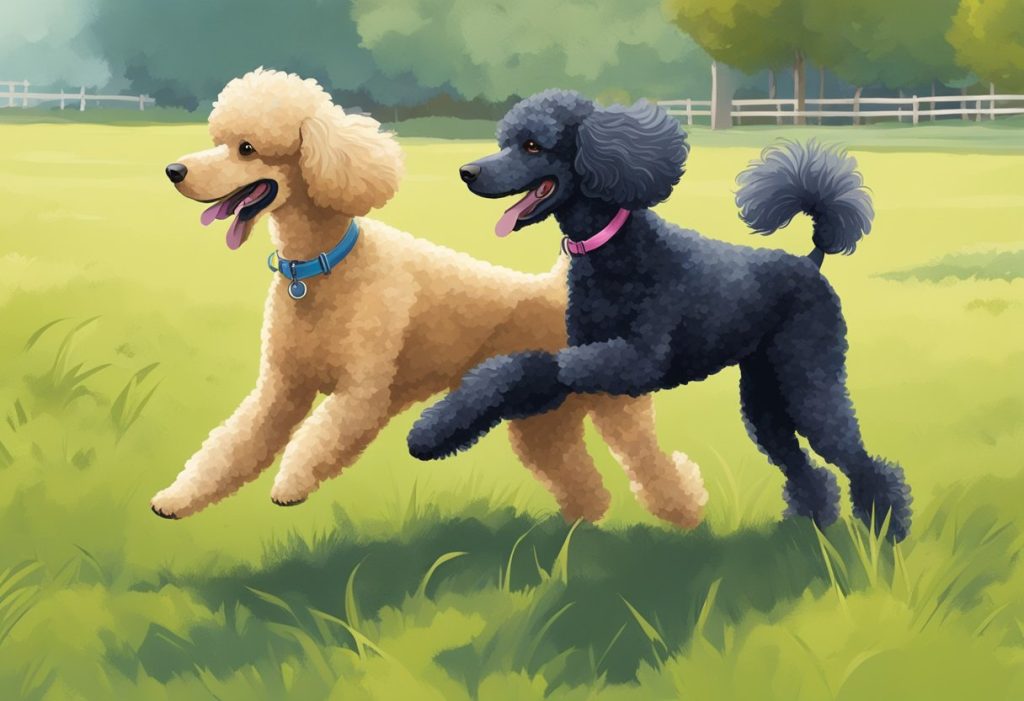

Socializing with Other Dogs
Introducing your poodle to other dogs early on is crucial. Positive experiences with vaccinated, well-behaved adult dogs can teach your poodle puppy appropriate behaviors. Organize playdates or attend puppy socialization classes where they can interact in a safe and controlled environment.
- Organize Playdates: Find calm, well-socialized dogs for your puppy to interact with.
- Attend Puppy Classes: Join classes that offer supervised play and interaction with other puppies.
Socializing with People
Poodles are known for being friendly and intelligent, but they also need to learn how to interact with various people to prevent timidity. Exposure to different types of people in a variety of environments can build their confidence. Always use positive reinforcement to reward good behavior during these encounters.
- Introduce to Family and Friends: Ensure your poodle meets a diverse group of people.
- Use Positive Reinforcement: Give treats and praise to encourage friendly behavior.
Health Considerations for Playful Poodles
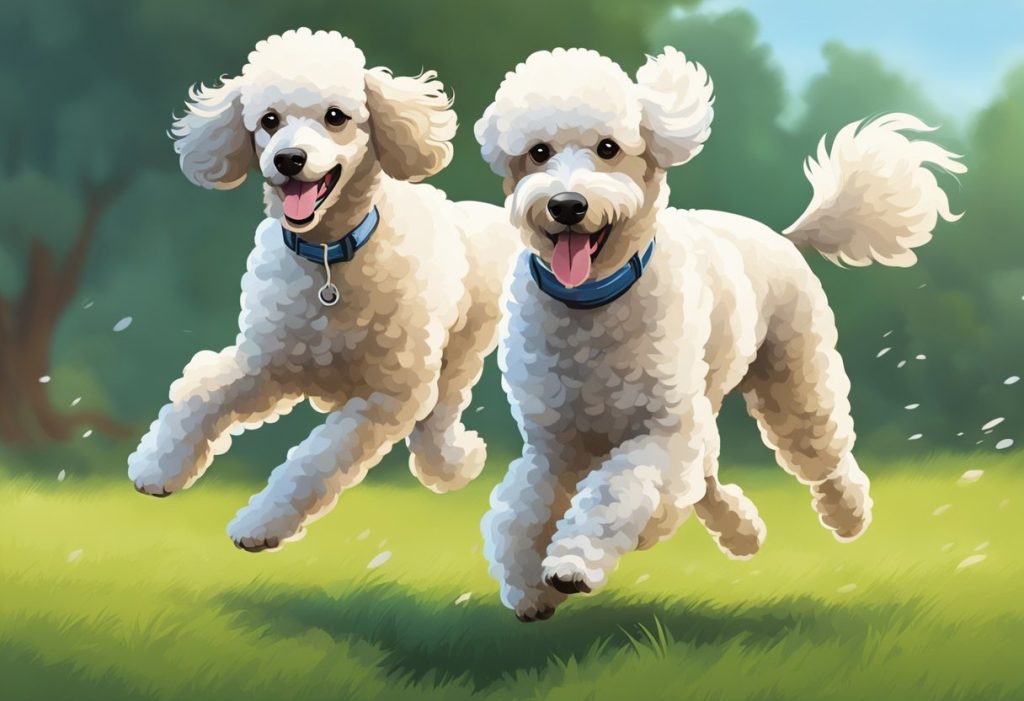

Taking care of your poodle’s health is crucial to ensure they live a happy, active life. Playful poodles can face specific health challenges, but with the right knowledge, you can support their well-being.
Common Health Issues
Poodles are generally healthy, but they can be prone to certain issues:
- Orthopedic Problems: Conditions like hip dysplasia can affect poodles, particularly in their active bouts of play.
- Bloat: This serious condition, more formally known as gastric dilatation-volvulus (GDV), requires immediate veterinary attention.
- Endocrine Disorders: Poodles might develop Addison’s disease or Cushing’s disease, which affect hormone production.
It’s important to regularly visit the vet for check-ups to monitor for these conditions, especially as your poodle ages. Additionally, familiarizing yourself with the symptoms of these conditions, such as lethargy in the case of endocrine disorders, or restlessness and a distended abdomen in the event of bloat, can be life-saving.
Diet and Nutrition
A proper diet can help prevent certain health issues and ensure your playful poodle has the energy for fun activities:
- Balanced Meals: Ensure your poodle gets a diet rich in proteins, carbohydrates, fats, vitamins, and minerals appropriate for their life stage.
- Avoid Overfeeding: Poodles can suffer from obesity, which exacerbates joint issues and bloat. Monitor their portion sizes.
Providing a balanced diet and maintaining a feeding schedule can significantly contribute to your poodle’s overall health. Just as you enjoy your meals, your poodle will appreciate the care you put into theirs. Remember, a healthy diet fuels a playful spirit.
Finding the Right Toys for Poodles
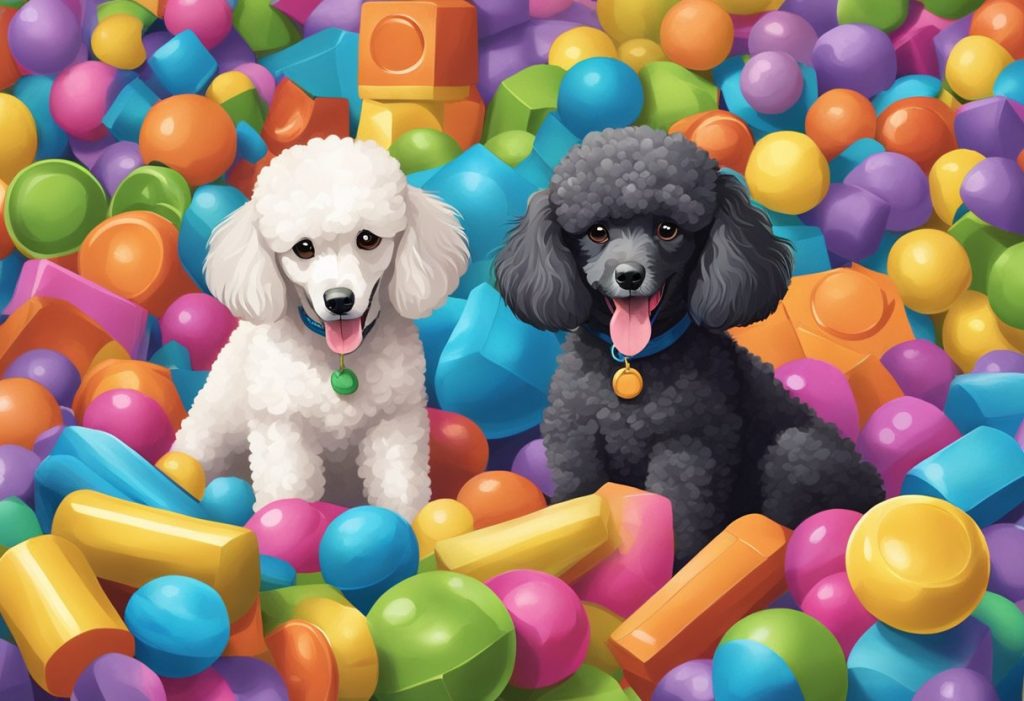

When choosing toys for your Poodle, you’ll want to consider variety and safety to provide stimulating play while ensuring that all toys are appropriate for your dog’s size and chew strength.
Types of Dog Toys
Interactive Toys: Poodles are highly intelligent, so toys that challenge their mind are essential. Puzzle toys like treat dispensers or hide-and-seek games keep your Poodle engaged and can also slow down their eating to prevent bloat.
Fetch Toys: Since Poodles are energetic, they often enjoy games of fetch. The Chuckit! Flying Squirrel is an excellent choice as it bounces high and floats in water, catering to their love for both land and aquatic play.
Chew Toys: Satisfy your Poodle’s need to chew with durable toys. For puppies, the Nylabone Petite Dental Puppy Chew is designed to promote oral health while entertaining your pup.
Choosing Safe Toys
- Size Matters: Make sure the toys are the right size for your Poodle. Smaller Poodles, like toy varieties, need smaller toys that they can easily bite and carry without risking choking.
- Material Check: Look for non-toxic materials that withstand your Poodle’s chewing habits. Avoid toys with small parts or that can be easily torn apart, which could be ingested and cause harm.
- Replace Regularly: Inspect toys often and replace them when they start to show signs of wear. A broken toy can lead to sharp edges or choke hazards.
Remember, what works for one Poodle may not work for another, so it’s important to tailor your toy selection to your furry friend’s specific needs and preferences.
Challenges of Owning Playful Poodles
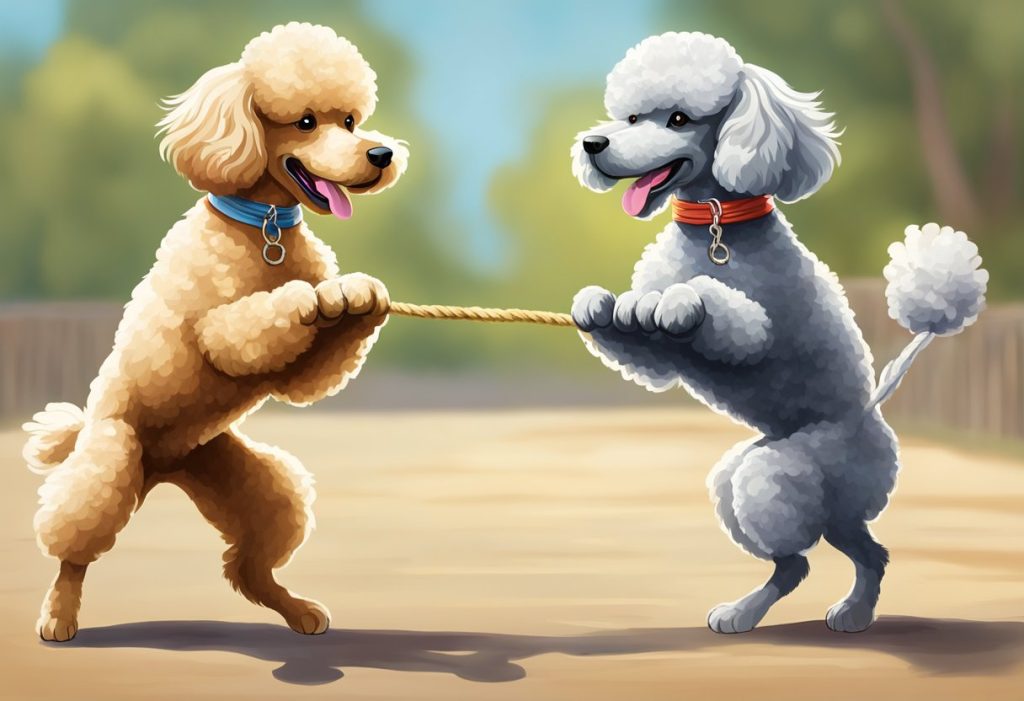

When you bring a playful Poodle into your home, you’re in for a joyous time, but there are a few challenges you’ll want to prepare for:
High Energy Levels: Your Poodle will have abundant energy, requiring regular exercise to stay happy and healthy. Daily walks and playful sessions are a must to manage their bouncy nature.
- Physical stimulation: Long walks, runs, or playtime at the dog park.
- Mental stimulation: Puzzle toys or games like hide-and-seek.
Grooming Needs: Poodles are known for their unique coats, which necessitate consistent grooming. Regular appointments with a professional groomer are recommended to keep their coat in good shape.
- Brushing: Several times a week to prevent mats.
- Trimming: Every 3-6 weeks to maintain their coat length.
Separation Anxiety: Poodles may develop separation anxiety if left alone for too long. They thrive on companionship and can become stressed in your absence.
- Solutions: Consider doggie daycare, a pet sitter, or interactive toys to keep them engaged.
Training Requirements: While they are highly intelligent, Poodles need early and ongoing training to channel their smarts positively. Structured training helps in managing their zealous personality.
- Consistency is key: Same commands and rules.
- Positive reinforcement: Use treats and praise to encourage good behavior.
Keep these points in mind, and you’ll navigate the challenges of owning a playful Poodle with greater ease.
Frequently Asked Questions
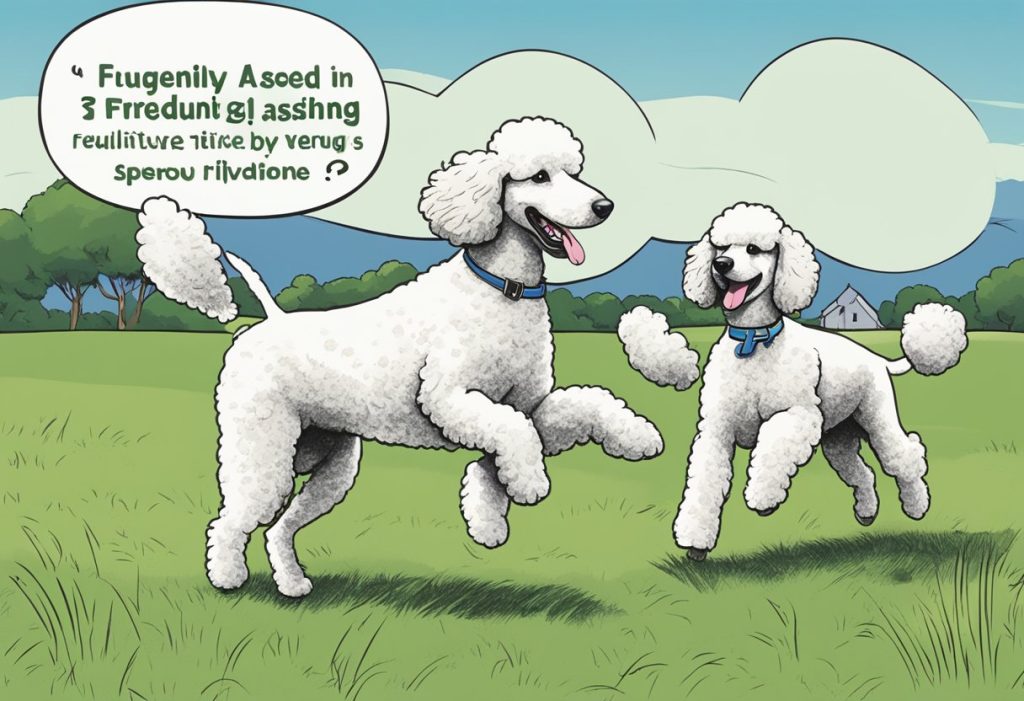

In this section, you’ll find targeted advice for enhancing the well-being and enjoyment of your playful poodle through strategic playtime, socializing tips, and health guidance.
What should I look for when choosing a breeder for a poodle?
When selecting a breeder, ensure they are reputable, can provide health clearances for both puppy and parent, and they follow ethical breeding practices. Visiting the breeder is crucial to observe the living conditions and temperament of your potential furry companion.
How often should I schedule playtime for my poodle?
Poodles are energetic and benefit from daily playtime. Aim to schedule at least one to two play sessions every day to keep them mentally and physically stimulated.
What are some engaging activities to do during playtime with my poodle?
Engage your poodle with activities like fetch, agility training, hide and seek, and interactive toys that challenge their intelligence and satisfy their curiosity.
How can I socialize my poodle with other dogs safely?
Introduce your poodle to other dogs gradually in controlled environments, such as a well-managed dog park or during obedience classes, to ensure positive interactions and safe socialization.
Are there specific health concerns to be aware of when raising a playful poodle?
Poodles may be prone to certain hereditary health issues such as hip dysplasia, so ensure they get regular check-ups and stay active, but not overly exerted, during playtime to maintain joint health.
What is the best way to introduce a new poodle to my existing pets?
When introducing a new poodle to your pets, do so in a neutral space, keep the initial interactions short, and monitor their behavior closely. Gradual, supervised meetings can promote a peaceful acclimation.




